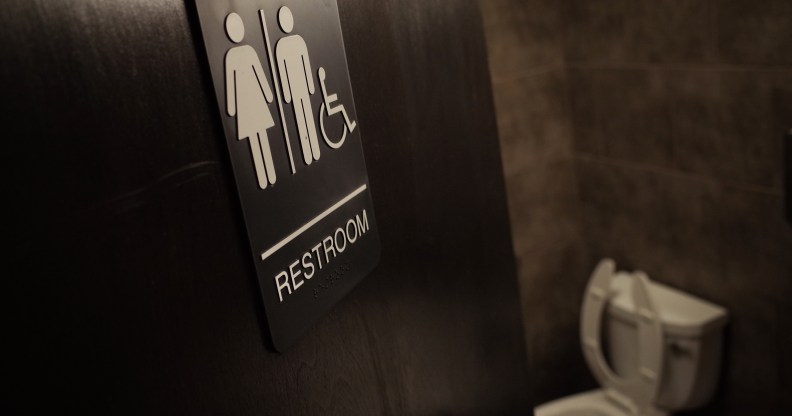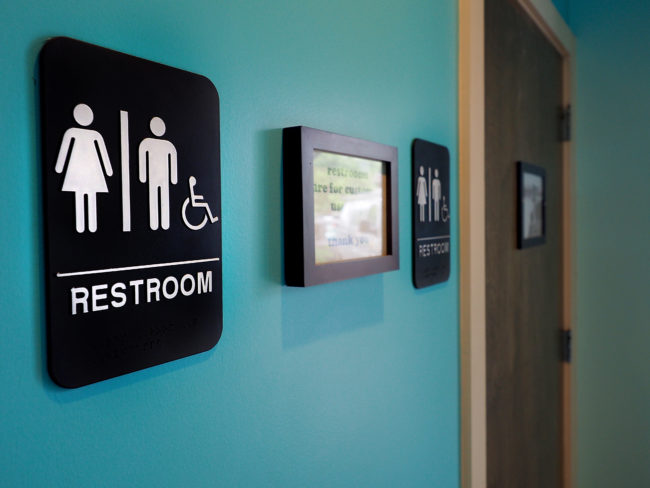Missouri Supreme Court sides with trans teen in bathroom ban case

MANDEL NGAN/AFP/Getty
The Missouri Supreme Court has sided with a transgender teenager who is challenging a bathroom ban.
The teen, who is identified in the court documents as RMA, had launched legal action against Blue Springs School district after he was barred from using the boys’ restrooms and locker rooms.
His lawsuit against the school district was dismissed by Jackson County Circuit Court, which ruled he had no basis to appeal under the law of Missouri, which bans discrimination based on sex but has no explicit protections based on gender identity or sexual orientation.
However, the Missouri Supreme Court on Tuesday (February 26) overturned the decision, finding that the teen, who has lived as male since the age of nine, has the right to pursue a legal challenge under the under the state’s human rights act arguing discrimination based on sex.
Transgender teen wins right to challenge bathroom ban
An opinion penned by Judge Paul C. Wilson states: “RMA’s petition alleges he is a member of a protected class, he was discriminated against in the use of a public accommodation, his status as a member of a protected class was the basis for the discrimination he suffered, and he sustained damages.
“At this stage of the proceedings, that is all that is required of R.M.A; therefore, the circuit court should have overruled.”
It adds that the Missouri Human Rights Act “plainly prohibits discrimination by the state or its subdivisions on the basis of sex.”

Unisex signs hang outside bathrooms at Toast Paninoteca on May 10, 2016 in Durham, North Carolina. (Sara D. Davis/Getty)
The court remanded the bathroom ban case back to the circuit court for further proceedings.
The bathroom ban ruling came the same day as the Missouri Supreme Court ruled that gay people could also pursue discrimination cases under sex discrimination laws, despite the absence of specific sexual orientation protections.
Bathroom ban ‘rooted in ignorant and incorrect assumptions’
Both decisions were welcomed by campaigners.
In a release, ACLU of Missouri legal director Tony Rothert said: “Members of the LGBTQ community should enjoy the same protections against sex-based discrimination as everyone else.
“Excluding LGBTQ individuals from legal protections was justified by outdated, destructive stereotypes and ignored the lived reality of thousands of people in our state.”
Missouri’s Human Rights Act prohibits discrimination in employment, housing, and public accommodations based on race, sex, and national origin, but there is no explicit mention of sexual orientation and gender identity.
ACLU of Missouri executive director Jeffrey Mittman added: “Discrimination based on gender expression and orientation is rooted in ignorant and incorrect assumptions.
“Allowing discriminatory policies and laws to stand harms our LGBTQ neighbours.
“We should all be working toward a more inclusive Missouri – and through legislation like the Missouri Nondiscrimination Act we hope to bring an end to cases like this one and give Missouri’s LGBTQ individuals clear and defined legal protections.”
The ACLU noted: “This decision falls in line with federal court decisions finding federal law against sex discrimination protect lesbian, gay, and transgender people.
“Time and again, courts have refused to allow generalizations about individuals—or who they love—to play any role in employment or accommodations decisions.”

